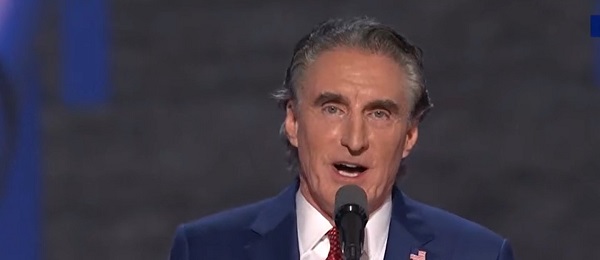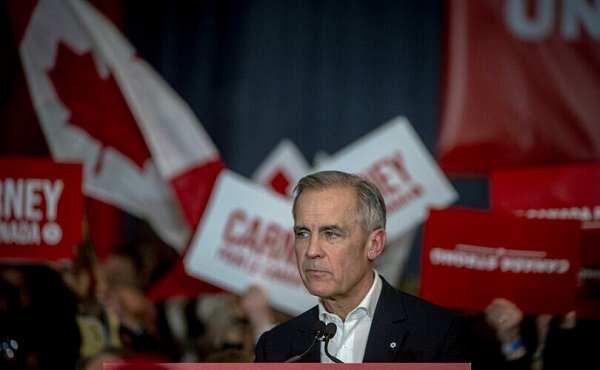Daily Caller
Pipelines and Energy Top Priorities for Trump’s Interior Secretary

North Dakota Gov. Doug Burgum speaks to the Republican National Convention, July 17, 2024. (Screen Capture/CSPAN)

From the Daily Caller News Foundation
By Adam Pack
Senate Overwhelmingly Confirms Doug Burgum As Trump’s Interior Secretary
The Senate confirmed former North Dakota Gov. Doug Burgum in a bipartisan fashion to lead President Donald Trump’s Department of Interior Thursday evening.
Senators overwhelmingly approved Burgum’s nomination 79 to 18. Three senators did not vote. Under the prior administration, we went from a nation of energy dominance to a nation of energy dependence.
Dear Readers:
As a nonprofit, we are dependent on the generosity of our readers. Please consider making a small donation of any amount here. Thank you!
America is an energy superpower. We should act like it. @DougBurgum and @ChrisAWright_ are America’s energy all-stars. I strongly support their nominations. pic.twitter.com/3o4xuan31r
— Sen. John Barrasso (@SenJohnBarrasso) January 30, 2025
Senate Republicans endorsed Burgum’s nomination, saying he was committed to reversing the work of his predecessor, former Interior Secretary Deb Haaland, to restrict energy resources. Haaland worked to block oil and gas leasing in development in Alaska.
“Governor Burgum knows that America’s natural resources are our greatest national asset,” Senate Majority Leader John Thune said Wednesday on the Senate floor prior to Burgum’s confirmation vote. “Too often, under the Biden administration, the Interior Department was the tip of the spear in restricting development of America’s resources.”
Burgum promised to prioritize energy abundance during his leadership over the Interior Department.
“The American people clearly placed their confidence in President Trump to achieve Energy Dominance,” Burgum wrote in his opening remarks to the Senate Energy and Natural Resources (ENR) Committee during his confirmation hearing on Jan 16. “Energy Dominance is the foundation of historic American prosperity, affordability for American families, and unrivaled national security.”
“President Trump’s Energy Dominance vision will end wars abroad and make life more affordable for every family by driving down inflation,” Burgum added. “President Trump will achieve these goals while championing clean air, clean water, and our beautiful land.”
Burgum won the support of a majority of Senate Democrats, including Democratic New Mexico Sen. Martin Heinrich who serves as the lead Democrat on the Senate ENR Committee.
“I clearly do not agree with Governor Burgum on every issue,” Heinrich wrote in a statement on Jan. 23. “However, I voted to confirm Governor Burgum’s nomination for Interior Secretary because I have found that a healthy relationship with the Secretary of Interior is critical to securing the best outcomes for the State of New Mexico.”
Trump has tasked Burgum with leading a newly-created interagency National Energy Council to cut regulations affecting the energy sector and harness private sector investment related to energy innovation. The president also appointed Burgum to a seat on the National Security Council, a rare appointment for an energy secretary.
Burgum served two terms as North Dakota’s governor beginning in December 2016. He launched a presidential run in June 2023, but struggled to gain traction and suspended his campaign that December. He endorsed Trump in January 2024 and served as a campaign surrogate throughout the remainder of the race.
Thune teed up confirmation votes Thursday evening on energy executive Chris Wright to lead the Department of Energy and former Republican Georgia Rep. Doug Collins to lead the Department of Veterans’ Affairs.
Business
Scott Bessent Says Trump’s Goal Was Always To Get Trading Partners To Table After Major Pause Announcement


From the Daily Caller News Foundation
By
Secretary of the Treasury Scott Bessent told reporters Wednesday that President Donald Trump’s goal was to have major trading partners agree to negotiate after Trump announced a 90-day pause on reciprocal tariffs for many countries after dozens reached out to the administration.
Trump announced the pause via a Wednesday post on Truth Social that also announced substantial increases in tariffs on Chinese exports to the United States, saying 75 countries had asked to talk. Bessent said during a press event held alongside White House press secretary Karoline Leavitt that Trump had obtained “maximum leverage” to get trading partners to negotiate with the April 2 announcement of reciprocal tariffs.
“This was his strategy all along,” Bessent told reporters during an impromptu press conference at the White House. “And that, you know, you might even say that he goaded China into a bad position. They, they responded. They have shown themselves to the world to be the bad actors. And, and we are willing to cooperate with our allies and with our trading partners who did not retaliate. It wasn’t a hard message: Don’t retaliate, things will turn out well.”
Dear Readers:
As a nonprofit, we are dependent on the generosity of our readers.
Please consider making a small donation of any amount here.
Thank you!
WATCH:
China imposed retaliatory tariffs on American exports to the communist country Wednesday, imposing an 84% tariff on U.S. goods after Trump responded to a 34% tariff by taking American tariffs to 104%.
“Based on the lack of respect that China has shown to the World’s Markets, I am hereby raising the Tariff charged to China by the United States of America to 125%, effective immediately,” Trump said. “At some point, hopefully in the near future, China will realize that the days of ripping off the U.S.A., and other Countries, is no longer sustainable or acceptable.”
“They kept escalating and escalating, and now they have 125% tariffs that will be effective immediately,” Bessent said during the press conference.
Bessent said that China’s actions would not harm the United States as much as it would their own economy.
“We will see what China does,” Bessent said. “But what I am certain of, what I’m certain of, is that what China is doing will affect their economy much more than it will ours, because they have an export-driven, flood the world with cheap export model, and the rest of the world now understands.”
The Dow Jones Industrial average closed up 2,962.86 points Wednesday, with the NASDAQ climbing by 1,755.84 points and the S&P 500 rising 446.05 points, according to FoxBusiness.
Banks
Wall Street Clings To Green Coercion As Trump Unleashes American Energy


From the Daily Caller News Foundation
By Jason Isaac
The Trump administration’s recent move to revoke Biden-era restrictions on energy development in Alaska’s North Slope—especially in the Arctic National Wildlife Refuge (ANWR)—is a long-overdue correction that prioritizes American prosperity and energy security. This regulatory reset rightly acknowledges what Alaska’s Native communities have long known: responsible energy development offers a path to economic empowerment and self-determination.
But while Washington’s red tape may be unraveling, a more insidious blockade remains firmly in place: Wall Street.
Despite the Trump administration’s restoration of rational permitting processes, major banks and insurance companies continue to collude in starving projects of the capital and risk management services they need. The left’s “debanking” strategy—originally a tactic to pressure gun makers and disfavored industries—is now being weaponized against American energy companies operating in ANWR and similar regions.
Dear Readers:
As a nonprofit, we are dependent on the generosity of our readers.
Please consider making a small donation of any amount here. Thank you!
This quiet embargo began years ago, when JPMorgan Chase, America’s largest bank, declared in 2020 that it would no longer fund oil and gas development in the Arctic, including ANWR. Others quickly followed: Goldman Sachs, Wells Fargo, and Citigroup now all reject Arctic energy projects—effectively shutting down access to capital for an entire region.
Insurers have joined the pile-on. Swiss Re, AIG, and AXIS Capital all publicly stated they would no longer insure drilling in ANWR. In 2023, Chubb became the first U.S.-based insurer to formalize its Arctic ban.
These policies are not merely misguided—they are dangerous. They hand America’s energy future over to OPEC, China, and hostile regimes. They reduce competition, drive up prices, and kneecap the very domestic production that once made the U.S. energy independent.
This isn’t just a theoretical concern. I’ve experienced this discrimination firsthand.
In February 2025, The Hartford notified the American Energy Institute—an educational nonprofit I lead—that it would not renew our insurance policy. The reason? Not risk. Not claims. Not underwriting. The Hartford cited our Facebook page.
“The reason for nonrenewal is we have learned from your Facebook page that your operations include Trade association involved in promoting social/political causes related to energy production. This is not an acceptable exposure under The Hartford’s Small Commercial business segment’s guidelines.”
That’s a direct quote from their nonrenewal notice.
Let’s be clear: The Hartford didn’t drop us for anything we did—they dropped us for what we believe. Our unacceptable “exposure” is telling the truth about the importance of affordable and reliable energy to modern life, and standing up to ESG orthodoxy. We are being punished not for risk, but for advocacy.
This is financial discrimination, pure and simple. What we’re seeing is the private-sector enforcement of political ideology through the strategic denial of access to financial services. It’s ESG—Environmental, Social, and Governance—gone full Orwell.
Banks, insurers, and asset managers may claim these decisions are about “climate risk,” but they rarely apply the same scrutiny to regimes like Venezuela or China, where environmental and human rights abuses are rampant. The issue is not risk. The issue is control.
By shutting out projects in ANWR, Wall Street ensures that even if federal regulators step back, their ESG-aligned agenda still moves forward—through corporate pressure, shareholder resolutions, and selective financial access. This is how ideology replaces democracy.
While the Trump administration deserves praise for removing federal barriers, the fight for energy freedom continues. Policymakers must hold financial institutions accountable for ideological discrimination and protect access to banking and insurance services for all lawful businesses.
Texas has already taken steps by divesting from anti-energy financial firms. Other states should follow, enforcing anti-discrimination laws and leveraging state contracts to ensure fair treatment.
But public pressure matters too. Americans need to know what’s happening behind the curtain of ESG. The green financial complex is not just virtue-signaling—it’s a form of economic coercion designed to override public policy and undermine U.S. sovereignty.
The regulatory shackles may be coming off, but the private-sector blockade remains. As long as banks and insurers collude to deny access to capital and risk protection for projects in ANWR and beyond, America’s energy independence will remain under threat.
We need to call out this hypocrisy. We need to expose it. And we need to fight it—before we lose not just our energy freedom, but our economic prosperity.
The Honorable Jason Isaac is the Founder and CEO of the American Energy Institute. He previously served four terms in the Texas House of Representatives.
-

 John Stossel2 days ago
John Stossel2 days agoGovernment Gambling Hypocrisy: Bad Odds and No Competition
-

 Alberta2 days ago
Alberta2 days agoAlberta’s embrace of activity-based funding is great news for patients
-

 2025 Federal Election1 day ago
2025 Federal Election1 day agoCommunist China helped boost Mark Carney’s image on social media, election watchdog reports
-

 2025 Federal Election2 days ago
2025 Federal Election2 days agoMark Carney’s radical left-wing, globalist record proves he is Justin Trudeau 2.0
-

 2025 Federal Election1 day ago
2025 Federal Election1 day agoFifty Shades of Mark Carney
-

 2025 Federal Election2 days ago
2025 Federal Election2 days agoMark Carney pledges another $150 million for CBC ahead of federal election
-

 Energy23 hours ago
Energy23 hours agoTrump signs four executive orders promoting coal industry
-

 2025 Federal Election1 day ago
2025 Federal Election1 day agoConservative Party urges investigation into Carney plan to spend $1 billion on heat pumps









